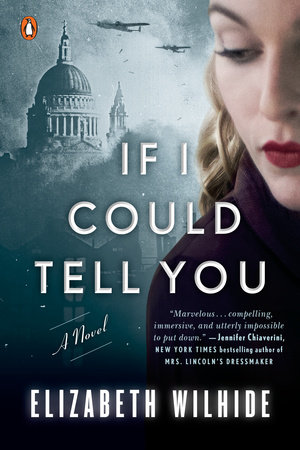READERS GUIDE
Introduction
On the eve of World War II, Julia Compton is living a picture-perfect life, including a handsome husband, a beloved son, and a beautiful home in Suffolk, England. It seems that Julia has it all, but a chance meeting with film director Dougie Birdsall – and their instant, overpowering attraction to each other – changes everything. Author Elizabeth Wilhide follows Julia’s journey from that fateful moment in 1939 through to the end of WWII in her novel
If I Could Tell You, a story of passion and betrayal, and an exploration of a defining event in one woman’s life set against the backdrop of the London Blitz.
When Julia’s husband discovers her affair, his reaction is both swift and devastating, immediately leaving her penniless. Her impending divorce severs her ties to friends and family, and she struggles to create a new life in London within Dougie’s bohemian social circle. As those around them face the ever-present threat of bombing with a blend of patriotic can-do attitude and devil-may-care revelry, Julia and Dougie create a private world of sexual passion and artistic inspiration. But the stress of wartime London, the reality of domestic life together, and Julia’s heartbreak over the loss of contact with her son soon transform their affair into a mixture of resentment and suspicion. Julia loses everything to be with Dougie, but eventually loses him as well.
Demonstrating a great depth of historical research, Wilhide immerses her readers in the world of wartime London, providing a fresh perspective on history through the intimate details of daily life. Her language is vivid and precise, with a cinematic quality that echoes Dougie’s filmmaking; Julia’s life-threatening experience in a London air raid, in particular, is conveyed in impressionistic, visual imagery that is deeply affecting.
If I Could Tell You is an engrossing, unflinching read, focused on a flawed but deeply relatable heroine and her journey of romantic desire, heartache, and transformation.
After having lost her lover and possibly her son, without a home or financial security, Julia discovers a reservoir of inner strength and, along with it, a way to redefine herself and serve her country in the process. In both her passionate affair and the reconstruction of her life, Julia’s progress through
If I Could Tell You will resonate with readers, challenge them, break their hearts, and even inspire them. The novel’s final surprising turn of events will linger with them long after the book is closed.
Questions and Topics for Discussion
1. Why does Wilhide begin If I Could Tell You with the scene of the bombing? What was your reaction? Did you understand what was happening?
2. The title of the novel is from a poem of the same name by W. H. Auden, a portion of which Wilhide includes as a preface to the book. Having read the novel, what is the significance of those three lines?
3. When her husband, Richard, discovers her affair, Julia loses everything. Do you believe Dougie is worth the sacrifice? Does Julia? Does her opinion change at any point in the novel?
4. Britain’s ‘stiff upper lip’ during the London Blitz was legendary and still informs the popular view of the British people. How do you think you would have behaved if you had been in Julia’s situation?
5. Julia repeatedly thinks to herself: ‘Protect my family.’ When does this phrase appear in the novel? What does she mean? In which ways does she or doesn’t she protect her family?
6. Mrs. Hoffmann tells Julia that her own husband was ‘not what you might call faithful, but dead loyal just the same’ (p. 288). What is the difference?
7. Julia’s friendships with other women in the novel are complicated and shift over the course of the story. Who are the key female figures? What is their influence on Julia?
8. Do you believe it’s possible to be monogamous for one’s entire life?
9. What does Julia learn about herself from her relationship with Dougie? What does he learn from her?
10. If you were to cast If I Could Tell You as a movie, who would you cast as Dougie and Julia?
11. Reread Julia and Dougie’s conversation in the final pages of the novel. What is Julia referring to in the final line when she thinks, ‘She had work to do’ (p. 309)?
About this Author
Elizabeth Wilhide is the author of the novel
Ashenden, as well as more than twenty books on interior design, decoration, and architecture, and has been a coauthor and contributor to many more. Born in the United States, she has lived in Britain since 1967. She has two children and lives in South London.

